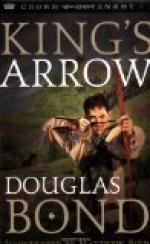“Is A-jem-sek a river?” Jean asked.
“A-ha-ha.”
“Will we soon be there?”
“Wan sight, mebbe.”
Jean had learned that these Indians measured short distances according to sight, and that they said “one sight,” “two sights,” “three sights,” instead of miles. She now knew that the A-jem-sek, whatever that river might be, was not far away, and that it must be a branch of the St. John. And between the two, farther on, were the King’s mast-cutters. Her hopes rose high. How good it would be to see white men she could trust. They would help her to reach home, she felt certain.
They were moving down a gentle slope now, and making fair progress. Suddenly Sam stopped, and examined strange straggling tracks in the snow. Kitty and Jean also looked, the latter asking what they meant.
“White man,” Sam explained. “No snow-shoe.”
“Are they slashers?” Jean anxiously enquired.
Sam shook his head, and examined the tracks more closely.
“No slasher, no snow-shoe,” he said. “Funny track, all sam’ lost.”
As they proceeded, they came across other tracks, showing where men had been walking through the snow, wandering here and there, in an apparently aimless manner. Sam became very curious now, as well as cautious. He took the musket from Kitty, and carried it in readiness for any emergency. Jean was quite excited, and peered keenly ahead, not knowing what to expect next.
Except for the creaking of the snow-shoes, not a sound did they make as they sped onward, and in about half an hour the trees seemed suddenly to part and present an open space to their view. It was the A-jem-sek, a narrow stream connecting Lake K’tchi-kwis-pam with the Wu-las-tukw, so Sam explained to Jean. As they stepped out upon this river they saw two men but a short distance away, drawing a small sled loaded with wood, who stared with startled amazement at the sudden appearance of the three travellers.
CHAPTER XXII
IN DESPERATE STRAITS
As they advanced toward where the two men were standing, Jean was somewhat afraid lest they might be slashers. This fear, however, was at once removed when she beheld their pitiable condition. Their clothes were in tatters, and their bearded faces were drawn and haggard. They stared at her with eyes from which all hope had fled, and so weak did they seem that they could hardly stand. Their backs were bent as if through age, and they rested their hands upon the loaded sled for support. As Jean paused, smitten by a sudden feeling of awe, one of the men wearily lifted his hand and beckoned to her.
“Who are you?” she asked, when she had drawn near.
“We are as dead men,” was the hollow reply. “But in God’s name, who are you?”
“I am Jean Sterling, daughter of Colonel Sterling. I was carried away from home, but was rescued by these Indians, who are now taking me back to my father.”




